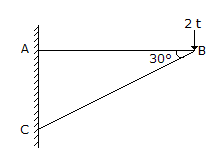Practice Test: Question Set - 11
1. If a body moves in such a way that its velocity increases by equal amount in equal intervals of time, it is said to be moving with
- (A) A uniform
retardation
- (B) A
uniform acceleration
- (C) A
variable acceleration
- (D) A
variable retardation
2. A number of forces acting simultaneously on a particle of a body
- (A) May
not be replaced by a single force
- (B) May
be replaced by a single force
- (C) May
be replaced by a single force through C.G. of the body
- (D) May
be replaced by a couple
3. A stone is thrown up a slope of inclination 60° to the horizontal. At what angle to the slope must the stone be thrown so as to land as far as possible from the point of projection?
- (A) 15°
- (B) 30°
- (C) 45°
- (D) 75°
4. If a body is acted upon by a number of coplanar non-concurrent forces, it may
- (A) Rotate
about itself without moving
- (B) Move
in any one direction
- (C) Move
in any one direction rotating about itself
- (D) All the above
5. If three rigid rods are hinged together to form a triangle and are given rotary as well as translatory motion, the number of instantaneous centers of the triangle, will be
- (A) 1
- (B) 2
- (C) 3
- (D) 4
6. If ‘α’ and ‘u’ are the angle of projection and initial velocity of a projectile respectively, the horizontal range of the projectile, is
- (A) u² sin α/g
- (B) u² sin² α/g
- (C) u² sin α/2g
- (D) u² sin² α/2g
7. The potential energy of a particle falling through a straight shaft drilled through the earth (assumed homogeneous and spherical) is proportional to
- (A) log r
- (B) r
- (C) r²
- (D) 1/r
Where r is the distance of the particle from
centre of the earth
8. From a circular plate of a diameter 6 cm is cut out a circle whose diameter is equal to the radius of the plate. The C.G. of the remainder from the centre of circular plate is at a distance of
- (A) 2.0 cm
- (B) 1.5 cm
- (C) 1.0 cm
- (D) 0.5 cm
9. If the gravitational acceleration at any place is doubled, the weight of a body, will
- (A) Be reduced
to half
- (B) Be doubled
- (C) Not be
affected
- (D) None of
these
10. A pilot flies a small plane in a vertical loop of radius ‘r’. At the top of its trajectory he experiences weightlessness. If the acceleration due to gravity is ‘g’, the speed of the plane at the top of its trajectory would be
- (A) Zero
- (B) Infinite
- (C) gr
- (D) 2gr
11. If a body is lying on a plane whose inclination with the horizontal is less than the angle of friction, then?
(i) A force is required to move the body
upwards
(ii) A force is required to move the body
downward
(iii) The body will not be in equilibrium
The correct answer is
- (A) Only (i)
- (B) Only (ii)
- (C) Both (i) and (ii)
- (D) Both (i) and (iii)
12. The acceleration of a particle moving along the circumference of a circle with a uniform speed, is directed
- (A) Radially
- (B) Tangentially
at that point
- (C) Away
from the centre
- (D) Towards the
centre
13. Work may be defined as
- (A) Force ×
distance
- (B) Force
× velocity
- (C) Force
× acceleration
- (D) None
of these
14. Pick up the correct statement from the following for the structure shown in below figure.
- (A) The
horizontal reaction at A is 2 √3t ←
- (B) The
horizontal reaction at C is 2 √3t →
- (C) The vertical
reaction at A is zero
- (D) All the
above
15. A shell travelling with a horizontal velocity of 100 m/sec explodes and splits into two parts, one of mass 10 kg and the other of 15 kg. The 15 kg mass drops vertically downward with initial velocity of 100 m/sec and the 10 kg mass begins to travel at an angle to the horizontal of tan"1 x, where x is
- (A) 3/4
- (B) 4/5
- (C) 5/3
- (D) 3/5
Next Tests:

